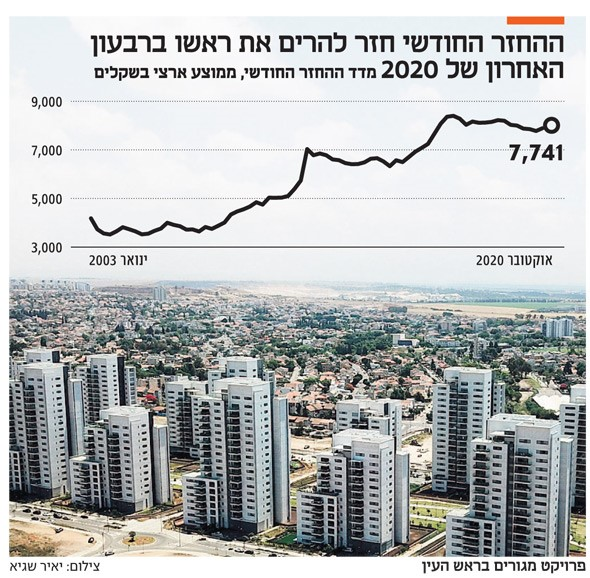Calcalist, Dotan Levy 23.03.2021
The year 2020 ended with a slight improvement in the situation of apartment buyers compared to 2019, according to the Alrov Institute of Real Estate Research's ability to purchase an apartment in Israel at the Koller Faculty of Management at Tel Aviv University in collaboration with Calcalist. At the end of 2020, the average monthly repayment on a loan at a financing rate of 70% was NIS 7,741 per month, a decrease of 1.3% compared to NIS 7,845 at the end of 2019. The equity required to purchase an apartment so that the monthly repayment does not exceed 30% of net household income decreased by 2.6 % To the amount of NIS 909,000.
However, when comparing these two indices to the third quarter of 2020, there is some deterioration in the situation of buyers. The monthly repayment increased by 1.4% in the fourth quarter compared to the third quarter, when the repayment was NIS 7,634. Shareholders' equity in the third quarter was 3.4% lower and amounted to NIS 879,000.

The monthly repayment indices and equity are affected by a number of parameters whose changes led to fluctuations between quarters: the level of monthly income, the interest rate on mortgages and apartment prices. The reason for the deterioration in the ability to purchase an apartment index between the third quarter and the fourth quarter is an average increase of 1.6% in apartment prices, while the average wage and mortgage interest rate maintained their level. The reason for the annual improvement in the situation of buyers is a decrease in interest rates of 0.29%. This effect was slightly offset by a 1.24% rise in house prices, and average income remained stable.
An examination of the fluctuations of the two indices over the past few years shows that the monthly repayment increased almost continuously in the years 2016-2015 from a level of NIS 6,266 to NIS 8,223 at the beginning of 2017, a jump of about 30%. This year the changes were relatively slight and ranged from NIS 7,634 to NIS 8,223 per month and for most of 2020 a certain decrease was recorded. Shareholders' equity also jumped significantly from NIS 626,000 at the beginning of 2015 to NIS 976,000 at the beginning of 2017, a jump of about 55%. This year, equity maintained relative stability at around NIS 900,000.
The study was conducted by Prof. Danny Ben-Shahar, head of the Alrov Institute of Real Estate Research and a researcher at the Koller Faculty of Management at Tel Aviv University, and Yarin Mani, a research fellow at the institute. "In the shadow of the homeless and the unemployed from the Corona period, there is uncertainty about the average monthly income in Israel," said Prof. Ben-Shahar. “Although data from the Central Bureau of Statistics show an increase in wages since the outbreak of the corona crisis, we have conservatively assumed that household income has remained unchanged over the past year. However, in June, state payments to workers in the IDF will end and we will have to understand what will happen to household income in the near future. " He also stressed that in 2020 there was a significant drop in mortgage interest rates, and she decided on the annual change and overcame the rise in housing prices: What keeps us from a real deterioration in housing availability is the decline in mortgage rates. "
At the municipal level, the monthly repayment required for a mortgage has increased compared to the previous quarter in seven of the 12 cities examined in the index. The equity required today for households in the sixth income deciles exceeds half a million shekels in all cities, except Beer Sheva, Haifa and Hadera.



